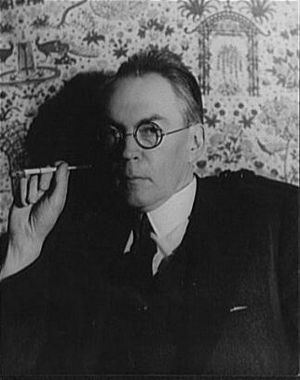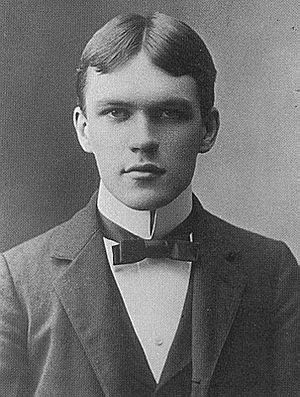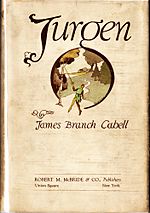James Branch Cabell facts for kids
Quick facts for kids
James Branch Cabell
|
|
|---|---|

James Branch Cabell photographed by Carl Van Vechten, 1935
|
|
| Born | April 14, 1879 Richmond, Virginia, U.S. |
| Died | May 5, 1958 (aged 79) Richmond, Virginia, U.S. |
| Occupation | Author |
| Alma mater | College of William and Mary |
| Genre | Fantasy fiction |
James Branch Cabell (born April 14, 1879 – died May 5, 1958) was an American author. Many people admired his books, which often used irony (saying the opposite of what you mean) and satire (using humor to criticize something).
Today, the main library at Virginia Commonwealth University is named after him.
Contents
About James Branch Cabell's Life
James Branch Cabell was born into a wealthy and well-known family in Virginia. He lived most of his life in Richmond. His family had been in Virginia since 1664. His great-grandfather, William H. Cabell, was the Governor of Virginia from 1805 to 1808. A place called Cabell County in West Virginia is named after the Governor.
James was the oldest of three brothers. His parents separated and later divorced in 1907. His aunt, Mary-Cooke Branch Munford, worked to help women get the right to vote and improve education.
Even though some people say "Ka-BELL," James himself said his name was "CAB-ble." He even wrote a short rhyme to help people remember: "Tell the rabble my name is Cabell."
Cabell started attending the College of William and Mary in 1894 when he was 15 years old. He graduated in June 1898. While he was a student, he also taught French and Greek at the college. For a short time, he was asked to leave the college because of a misunderstanding with a professor. However, he was allowed back and finished his degree.
After graduating, he worked as a newspaper reporter in New York City from 1898 to 1900. He returned to Richmond in 1901 and worked for the Richmond News.
In 1902, seven of Cabell's first stories were printed in national magazines. Over the next ten years, he wrote many short stories and articles. He wrote for popular magazines like Harper's Monthly Magazine and The Saturday Evening Post. He also spent a lot of time researching his family's history.
From 1911 to 1913, he worked for his uncle in coal mines in West Virginia. On November 8, 1913, he married Priscilla Bradley Shepherd, who had five children from a previous marriage. In 1915, their son, Ballard Hartwell Cabell, was born. Priscilla passed away in 1949. Cabell married again in 1950 to Margaret Waller Freeman.
During his life, James Branch Cabell published 52 books. These included novels, family histories, short story collections, and poems. In 1937, he was chosen to be a member of the American Academy of Arts and Letters, a group that honors important artists and writers.
Cabell died in 1958 in Richmond from a brain hemorrhage. He was first buried in the graveyard of the Emmanuel Church. The next year, his and his first wife's remains were moved to Hollywood Cemetery.
Important collections of Cabell's writings and papers are kept at Virginia Commonwealth University and the University of Virginia.
Honors and Legacy
In 1970, Virginia Commonwealth University (VCU) in Richmond named its main campus library the "James Branch Cabell Library" to honor him. In the 1970s, Cabell's own collection of books and his personal papers were moved from his home to this library.
This collection has about 3,000 books. It also includes his handwritten stories, notebooks, and scrapbooks. You can find magazines where his essays and stories were published. There are also letters he wrote to famous writers like H. L. Mencken and Ellen Glasgow, as well as letters to his family and friends. This special collection is kept in the library's Special Collections and Archives department.
VCU's student literary magazine is called Poictesme. This name comes from a made-up place in Cabell's famous series of books, Biography of the Life of Manuel.
Recently, VCU spent over $50 million to make the James Branch Cabell Library bigger and more modern. This made it one of the best libraries in the Richmond area and a top landmark library in the United States. In 2016, Cabell Library won the New Landmark Library Award. You can even take a virtual tour of the new library online.
His Books and Writings
Biography of the Life of Manuel
A large part of Cabell's writing is a series of books called the Biography of the Life of Manuel. This series tells the story of a character named Dom Manuel and his family through many generations. The Biography includes 25 books that Cabell wrote over 23 years.
Cabell believed the Biography was one big work. He oversaw its publication as a single set of 18 volumes, known as the Storisende Edition, published from 1927 to 1930. Many of these books also had special editions with illustrations by Frank C. Papé.
After finishing the Biography in 1932, Cabell started using a shorter professional name: "Branch Cabell." He used this shorter name for all his new books until There Were Two Pirates was published in 1946.
List of Works
- The Eagle's Shadow (1904)
- The Line Of Love (1905)
- Gallantry (1907/22)
- Branchiana (1907)
- The Cords Of Vanity: A Comedy Of Shirking (1909/21)
- Chivalry: Dizain Des Reines (1909/21)
- Branch Of Abingdon (1911)
- The Soul Of Melicent (1913)
- The Rivet In Grandfather's Neck: A Comedy Of Limitations, (1915)
- The Majors And Their Marriages (1915)
- The Certain Hour (1916)
- From The Hidden Way (1916/1924)
- The Cream Of The Jest (1917)
- Jurgen: A Comedy Of Justice (1919)
- Beyond Life (1919)
- Domnei: A Comedy Of Woman-Worship (1920)
- The Judging Of Jurgen (1920)
- Jurgen And The Censor (1920)
- Taboo: A Legend Retold From The Dighic Of Saevius Nicanor (1921)
- Figures Of Earth: A Comedy Of Appearances (1921)
- The Jewel Merchants (1921)
- Joseph Hergesheimer (1921)
- The Jewel Merchants (1921)
- The Lineage Of Lichfield: An Essay In Eugenics (1922)
- The High Place (1923)
- Straws And Prayer-Books (1924)
- The Silver Stallion (1926)
- The Music From Behind The Moon (1926)
- Something About Eve (1927)
- The Works (1927-30)
- The White Robe (1928)
- Ballades From The Hidden Way (1928)
- The Way Of Ecben (1929)
- Sonnets From Antan (1929)
- Some Of Us: An Essay In Epitaphs (1930)
- Townsend Of Lichfield (1930)
- Between Dawn And Sunrise (1930)
- These Restless Heads: A Trilogy Of Romantics (1932)
- Special Delivery: A Packet Of Replies (1933)
- Ladies And Gentlemen: A Parcel Of Reconsiderations (1934)
- Smirt: An Urbane Nightmare (1934)
- Smith: A Sylvan Interlude (1935)
- Preface To The Past (1936)
- Smire: An Acceptance In The Third Person (1937)
- The Nightmare Has Triplets (1937)
- Of Ellen Glasgow (1938)
- The King Was In His Counting House (1938)
- Hamlet Had An Uncle (1940)
- The First Gentleman Of America (1942)
- The St Johns: A Parade Of Diversities (1943)
- There Were Two Pirates (1946)
- Let Me Lie (1947)
- The Witch Woman (1948)
- The Devil's Own Dear Son (1949)
- Quiet Please (1952)
- As I Remember It: Some Epilogues In Recollection (1955)
- Between Friends (1962)
How James Branch Cabell Influenced Others
Many other writers thought highly of Cabell's work. These included famous authors like Mark Twain, Sinclair Lewis, H. L. Mencken, and Theodore Dreiser.
Even though most people today might not know his name, his books were very important. They greatly influenced later authors who wrote fantasy fiction, a type of story that often includes magic and imaginary worlds.
See also
 In Spanish: James Branch Cabell para niños
In Spanish: James Branch Cabell para niños
 | Laphonza Butler |
 | Daisy Bates |
 | Elizabeth Piper Ensley |



